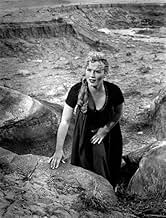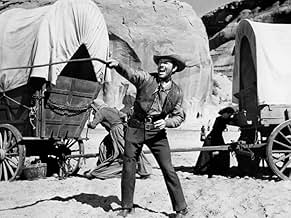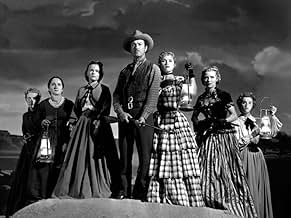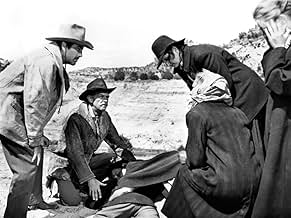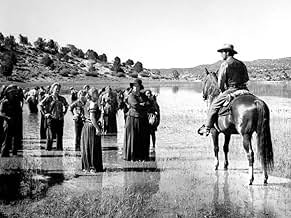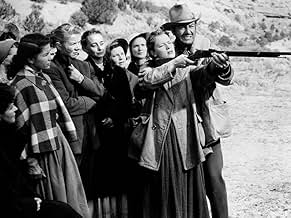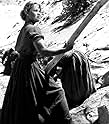NOTE IMDb
7,6/10
4,2 k
MA NOTE
Un guide de sentier escorte un groupe de femmes de Chicago à la Californie pour épouser des hommes qui ont récemment commencé à s'y installer.Un guide de sentier escorte un groupe de femmes de Chicago à la Californie pour épouser des hommes qui ont récemment commencé à s'y installer.Un guide de sentier escorte un groupe de femmes de Chicago à la Californie pour épouser des hommes qui ont récemment commencé à s'y installer.
- Réalisation
- Scénario
- Casting principal
- Récompenses
- 2 victoires au total
Claire Andre
- Pioneer Woman
- (non crédité)
Raymond Bond
- Preacher
- (non crédité)
Polly Burson
- Pioneer Woman
- (non crédité)
Archie Butler
- Outrider
- (non crédité)
Claire Carleton
- Flashy Woman
- (non crédité)
Bill Cartledge
- Outrider
- (non crédité)
Mary Casiday
- Pioneer Woman
- (non crédité)
Avis à la une
"Westward the Women" may not be the greatest western ever made but it's certainly one of the most unusual and is, indeed, very fine and I'm amazed it isn't better known. The women in question are 140 brides being brought West for for the male townsfolk in a Californian valley on a wagon-train lead by Robert Taylor. The director of the picture was William Wellman and William C. Mellor shot it in crisp black-and-white and it has a fine screenplay by Charles Schnee from a story by none other than Frank Capra.
As wagon-train movies go, it's not only unusual but remarkably robust and full of incident and it deals with the male/female dynamic with a surprising degree of honesty and if you don't think so, remember this was 1951. It's certainly not sentimental and Wellman approaches his subject with much the same documentary-like realism that John Ford brought to "Wagonmaster". In a good supporting cast Denise Darcel and Hope Emerson stand out.
As wagon-train movies go, it's not only unusual but remarkably robust and full of incident and it deals with the male/female dynamic with a surprising degree of honesty and if you don't think so, remember this was 1951. It's certainly not sentimental and Wellman approaches his subject with much the same documentary-like realism that John Ford brought to "Wagonmaster". In a good supporting cast Denise Darcel and Hope Emerson stand out.
I thoroughly enjoyed this film about a group of women being led by Robert Taylor's character to their new town. They are a motley bunch but pull together when the men desert them to travel and start a new life with the men they have chosen to be their husbands. Robert Taylor is fantastic as the man being taken to take them through, even though he believes it to be an impossible task. There are some genuinely touching moments in this movie, I had to have my tissues handy in places, but it is well worth a watch. One of the best Westerns I have seen and even better because the women have the chance to take centre stage for a change.
John McIntire approaches wagonmaster Robert Taylor with an interesting job and challenge. He wants to bring brides west to the settlement he's founded in the southwest United States. Taylor hires on a bunch of hands to escort the women and issues a no fraternization policy. When one of them tries to rape one of them, he shoots him out of hand. It's the unsettled frontier and as wagonmaster he's the law on that train as much as a captain on a ship at sea. Of course the hands mutiny and strand Taylor, McIntire, cook Henry Nakamura and the women.
This was a perfect western film for the post Rosie the Riveter generation. No reason at all why women couldn't deal with the rigors of a wagon train. Of course it helped to have the formidable Hope Emerson along.
Of course men and women will be men and women and Taylor breaks his own no fraternization policy with Denise Darcel. Of course this is away from the train when Darcel runs off.
William Wellman delivers us a no frills unsentimental western with gritty performances by Robert Taylor and the rest of the cast. In a bow to his colleague John Ford, Wellman does have a courtship dance at the settlement. I liked the use of the fiddle music playing Believe Me With All Those Endearing Young Charms and Drink to Me Only With Thine Eyes. Ford couldn't have staged it better.
Henry Nakamura had made a big hit in MGM's Go For Broke about the Nisei division in Italy. He was a funny little guy, I'm not sure he was even five feet tall. I loved the scene when he and Taylor find a stash of buried liquor and proceed on a toot. This was his last film though, roles for oriental players were hard to come by. I wonder whatever happened to him.
If you like traditional cowboy films, this one ain't for you, but given the constraints of 19th century society for the role of woman Westward the Women is quite a revelation.
This was a perfect western film for the post Rosie the Riveter generation. No reason at all why women couldn't deal with the rigors of a wagon train. Of course it helped to have the formidable Hope Emerson along.
Of course men and women will be men and women and Taylor breaks his own no fraternization policy with Denise Darcel. Of course this is away from the train when Darcel runs off.
William Wellman delivers us a no frills unsentimental western with gritty performances by Robert Taylor and the rest of the cast. In a bow to his colleague John Ford, Wellman does have a courtship dance at the settlement. I liked the use of the fiddle music playing Believe Me With All Those Endearing Young Charms and Drink to Me Only With Thine Eyes. Ford couldn't have staged it better.
Henry Nakamura had made a big hit in MGM's Go For Broke about the Nisei division in Italy. He was a funny little guy, I'm not sure he was even five feet tall. I loved the scene when he and Taylor find a stash of buried liquor and proceed on a toot. This was his last film though, roles for oriental players were hard to come by. I wonder whatever happened to him.
If you like traditional cowboy films, this one ain't for you, but given the constraints of 19th century society for the role of woman Westward the Women is quite a revelation.
This western is gritty and realistic, and does not spare the audience from the grim facts of an overland trek from St. Louis to California with a wagon train of women (the "weaker" sex, right?
As far as I know, this movie has no rival in its subject matter, and the stars are magnificent. You will laugh and you will cry, but most of all, you will come away with a deep admiration of those hearty pioneers and especially those wonderful women. I have the video in my library!
As far as I know, this movie has no rival in its subject matter, and the stars are magnificent. You will laugh and you will cry, but most of all, you will come away with a deep admiration of those hearty pioneers and especially those wonderful women. I have the video in my library!
Between 1930 and 1960, 97% of all movies (that's 14729239520520 films) were westerns--or so it would seem. And, sadly, almost all of them have one of about five different plots and variations on these plots. Because of this, I really have very little patience with the genre--though I must admit that I have reviewed quite a few westerns. The ones I like are often ones that are somehow a bit better--despite the familiar plots, fine acting and direction make them watchable. Rarely, very rarely, do I see one that not only has fine acting, direction AND a novel plot--and all that is in "Westward the Women".
The film begins in a remote part of the old west--so remote that there are no women for all the men. Because of this, the men hire a tough trail boss (Robert Taylor) to recruit the women and bring them to a small outpost. The problem, however, is that the only way is a long trek across the prairie--through Indian land and desert. These women sure have to be tough--otherwise they'll never make it. And, in fact, unlike any other western I can think of, many of the women DON'T.
What also makes this a very good film are the nice little characters within the film. So it's NOT just a Robert Taylor film but excels because of the fine ensemble cast. One of the standouts is Hope Emerson--a brawny actress who made a name for herself playing gangsters and other scary characters.
Overall, there's not a lot to dislike about the film and it's a nice little story about American history you don't normally hear. Worth seeing and a top-notch production--with a real lump-in-your-throat ending. Sweet, sentimental and exciting.
The film begins in a remote part of the old west--so remote that there are no women for all the men. Because of this, the men hire a tough trail boss (Robert Taylor) to recruit the women and bring them to a small outpost. The problem, however, is that the only way is a long trek across the prairie--through Indian land and desert. These women sure have to be tough--otherwise they'll never make it. And, in fact, unlike any other western I can think of, many of the women DON'T.
What also makes this a very good film are the nice little characters within the film. So it's NOT just a Robert Taylor film but excels because of the fine ensemble cast. One of the standouts is Hope Emerson--a brawny actress who made a name for herself playing gangsters and other scary characters.
Overall, there's not a lot to dislike about the film and it's a nice little story about American history you don't normally hear. Worth seeing and a top-notch production--with a real lump-in-your-throat ending. Sweet, sentimental and exciting.
Le saviez-vous
- AnecdotesWhen this film was broadcast on Spanish TV in 1985, in a remote mountain village near the French border where most of the inhabitants were male it inspired them to place an ad in some papers, requesting potential female partners from all over the country to come and marry the lonely country boys. As a result, a caravan of coaches loaded with dozens of young women from all over Spain turned up at the village for the blind date, and that day many of those lonely boys found the women of their lives.
- GaffesDuring a shooting lesson one of the men tells one of the women to "aim low that will make up for the recoil". When shooting a gun the bullet has long left the barrel, before the barrel begins to move in recoil. Aim low and you'll miss low.
- Citations
Patience Hawley: [to the awaiting bridegrooms] You can look us over, but don't think you're going to do the choosing! All the way from Independence, I've been staring at two things: one was this picture and the other was the rump of a mule... and don't ask me which was prettier!
- Crédits fousThe MGM lion, instead of roaring, is frozen in place.
- Versions alternativesAvalable in a colorized version on home video from Turner/MGM Home Video. Like many colorized versions of films, it was not authorized nor approved by anyone who worked on the film.
- ConnexionsFeatured in TCM Guest Programmer: Paul Aguirre (2007)
- Bandes originalesTo The West! To The West!
By Henry Russell
Meilleurs choix
Connectez-vous pour évaluer et suivre la liste de favoris afin de recevoir des recommandations personnalisées
- How long is Westward the Women?Alimenté par Alexa
Détails
- Date de sortie
- Pays d’origine
- Langues
- Aussi connu sous le nom de
- Caravana de mujeres
- Lieux de tournage
- Société de production
- Voir plus de crédits d'entreprise sur IMDbPro
Box-office
- Budget
- 2 203 000 $US (estimé)
- Durée1 heure 58 minutes
- Couleur
- Rapport de forme
- 1.37 : 1
Contribuer à cette page
Suggérer une modification ou ajouter du contenu manquant

Lacune principale
By what name was Convoi de femmes (1951) officially released in India in English?
Répondre

